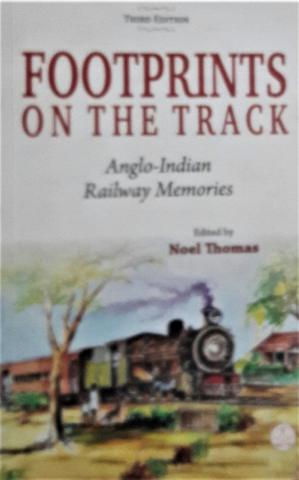
The book, comprising of forty-one short articles (and a couple of poems), mostly by Anglo-Indian contributors, some themselves ex-railwaymen, and some their family members, bring out, above all, the happiness and sense of belonging these railwaymen found with their employer – Indian Railways, and their railway surroundings.
The stories are from railway life all over the country, although more from the South Eastern, Eastern, Central and Southern Railways where Noel Thomas, the editor, spent more time. While each is a unique tale, there is the common thread of exceptional camaraderie and team work, which was most likely born at the work-place but got expressed in the social life in the railway colonies – the Institutes, Clubs, dance floors, bands, and the sports fields.
The important role of Anglo-Indians in shaping the work culture of the Loco Department have been wonderfully captured in V Anand’s contribution in this collection, titled “Unsung Heroes of the Railways in India”. His piece in the book not only stands out as a wonderful tribute to the Anglo Indians, it also brings out those good times in his very own style of expression and story-telling.
Noel Thomas himself has contributed three pieces in the collection, but the last one, “Anglo Indians: Loyal workers or Good Soldiers”, brings out a very different narrative – a dilemma non Anglo-Indian Supervisors and promoted officers faced until very recently, that is, about their loyalties towards the Railway vs the role of Unions. His piece brings out how it was the Anglo-Indian workforce of post-independence era which actually bred this feeling of loyalty, and a “Railway before Self” culture which endured long after they virtually disappeared from most locations on the railways.
I would strongly recommend this collection to all lovers of railway heritage and nostalgia, as each of the articles has an interesting anecdote or two of the rich life of the Anglo-Indian community which give the Indian Railways its unmistaken ethos. Not to mention a touch of classic British humour, as a sample, let me reproduce the concluding para from Bryan O. Peppin’s piece titled “Uncle Tom’s Cabin” at page 51:
In those days there used to be foot-plate inspections. British officers would poke around, looking for minute faults. One morning I had just steamed into Central from Erode and had given Kannan, a khalasi, charge of my box. My firemen had also joined me for tea at the dining room further down the station. From out of nowhere a British officer pounced on Kannan, demanding the names of the crew. ‘Who is the driver?’ thundered the Britisher. “Brute, Saar’, whined the khalasi, noticing the flummoxed expression on the officer’s face. ’And the firemen? ’’Step in son, and peep in, Saar’, said Kannan, a little more confidently. ‘What? Speak up!’ said the officer. Kannan repeated ‘Step in son, and peep in’. ‘Insolent fool! I’ll see the end of this!’ snorted the white man, as he swivelled and marched away. Half-way back to the engine, I noticed the officer’s heightened colour. Believing that introductions were in order, I said, ‘Sir, I’m Brewart, the driver. And these are my firemen, Stephenson, and Peppin’.”
(The above note has been contributed by S K Luthra)
